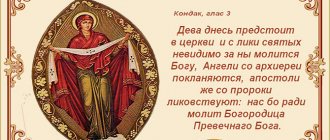General information about prayer
Among the large number of prayers in Orthodox theology, it is worth highlighting the religious text written by Saint Basil the Great back in the 4th century. By turning to God with such words, you can repent of your sins, ask for forgiveness for them and improve your spiritual and emotional state.
This prayer includes an appeal to the saint, who was a famous theologian. Reciting such a religious text allows one to get rid of sins committed through temptation, and young men and boys are most often predisposed to such sins.
As for women, the need to say a prayer against desecration of the soul and body appears in the following situations:
- with gluttony. If they tend to eat various treats, and even in large quantities;
- with weakness to alcoholic drinks. In this case, a person fully subordinates his will to various passions.
We should also not forget that in some cases people desecrate their soul and body not of their own free will. The following reasons often contribute to this:
- accident;
- forced action;
- serious illness;
- a natural process that cannot be controlled.
In men, defilement is often a consequence of natural physiological processes. In order to atone for a sin committed, you must first receive a blessing from your spiritual mentor. Consult with a priest: there are often cases when desecration occurs for reasons that are not considered sinful. In this case, you will not need to read this prayer book.
Be sure to follow church canons. Find out in more detail the issue regarding defilement in order to turn to the Lord with the proper words and thoughts and ask for forgiveness for the sins you have committed. In this case, prayer will have an effect. The main thing is to put all your faith and good intentions into it.
Desecration and the Sacrament of Communion
Communion is a sacrament during which a Christian, under the guise of bread and wine, receives the Body and Blood of Jesus Christ. It was established by the Lord during the Last Supper with the apostles on the eve of His suffering. In every church, Communion is different from the rest. In one - from a common silver bowl, in the other - from individual glasses.
Traditions are different and unique everywhere. Each denomination has its own teaching on how to administer Communion. God left the ritual so that everyone could partake of the Blood, the Body of Christ. For the righteous there are rules of purity that they observe and honor.
There is still debate whether defilement in a dream is a sin. In Christianity this is especially true. If a man has such an ejaculation, then for 7 days he washes his body and washes his clothes, since he himself is considered unclean. The next day he brings the priest 2 doves - one for sin, the second for cleansing. A prayer is read to Basil the Great.
If the eruption occurred intentionally, then it is impossible to stop it. Basil the Great is not addressed in prayers. So young people should not commit such sins if they want to be pure in body and spirit at the end of their lives.
Prayer against desecration of St. Basil the Great
Most merciful, imperishable, undefiled, sinless Lord, cleanse me, Thy unworthy servant, from all filthiness of the flesh and soul, and from my inattention and despondency the uncleanness that has come to me, along with all my other iniquities, and show me undefiled, O Master, for the goodness of Thy Christ , and sanctify me by the invasion of Your Most Holy Spirit: for having awakened* from the darkness of unclean ghosts of the devil and all kinds of filth, I may be deemed worthy with a clear conscience to open my unclean and unclean lips, and sing Thy all-holy name, the Father, and the Son, and the Holy Spirit, now and ever , and forever and ever. Amen.
If you find an error, please select a piece of text and press Ctrl+Enter.
Reasons for desecration
Our ancestors spoke about 3 reasons for desecration:
- The vice of lust is oversaturation. During abstinence, it is possible to expire during sleep.
- Due to recklessness, depraved thoughts. Seductive, dirty dreams, because of which “defiled water” flows out prematurely (not by nature, but by the intention of the evil spirit). It not only depletes the body, but makes the soul weaker, open to other vices.
- Abstinence. Those who take care of their body, the flesh, are most often attacked by the “insidious enemy” out of envy at the very time when the connection with God is the purest.
Many people face this problem because their bodies have not yet experienced a long fast. What is involuntary, unnatural, is excusable. In other cases, you need to repent and read a prayer to Basil the Great.
What is sin
There is no separate rule for women against defilement. But they can also have night dreams that end in a similar way to the act with a man. Of course, people have carnal desires, but they must be satisfied with a spouse, in a legal marriage. If a woman is lonely, she should fight passions, read prayers, and repent. Over time, the desires will become less and it will be easier to cope with them.
Other weaknesses can also provoke prodigal thoughts:
- susceptibility to overeating, gluttony - excess in food directly leads to inflamed flesh;
- drunkenness - when a person drowns his will in wine, then most likely later he will have to read the rule against defilement, because drunkenness and fornication very often happen in one place, at the same time.
There are also other types of desecration. For example, being in bad company, which David warns against in Psalm 1. Although here a lot depends on the purpose for which a person communicates with sinners. The apostles tried to teach faith to everyone, including evildoers. But joint entertainment and cohabitation are unlikely to be useful. Communication with heretics may end with the person himself adopting their views.
Moses taught that the following actions should be considered desecrating:
- fornication, including incest;
- worship of idols (this includes sorcery, reading horoscopes, turning to sorcerers, fortune telling);
- murder (including bullying, driving a person to suicide, leaving a person in danger);
- contact with a corpse, a sick person, or any other ritual unclean.
For the first three offenses, if they were proven, the Old Testament Jew would face death. Firstly, then there was no rule against desecration drawn up by Basil the Great. Secondly, even today for murder, for example, one will have to bear a heavier responsibility. According to church canons, anyone guilty of this sin is subject to strict penance in the form of excommunication.
Let us cleanse ourselves from all filthiness of the flesh and spirit
Fel
The Bible calls: “Let us cleanse ourselves from all filthiness of the flesh and spirit, perfecting holiness in the fear of the Lord” (2 Cor. 7:1). What did the apostle Paul mean?
CORONAVIRUS 2020 - BIBLE PLAZER
Defilement [Heb. tuma, tsoa, ki] , i.e. uncleanness (Lamentations 1:9, in the Synodal translation - “uncleanness”), as well as “garbage” (Isaiah 4:4); used as an image of sin.
9 He had uncleanness on his hem, but he did not consider his future, and therefore he was extremely humbled, and he had no comforter. “Look, O Lord, at my misfortune, for the enemy has become magnified!” (Lam. 1:9)
4 When the Lord will wash away the filthiness of the daughters of Zion and purify the blood of Jerusalem from among her with the spirit of judgment and the spirit of fire. (Isa. 4:4)
In Isa. 28:8 defilement means vomit (in the Synod. Transl. - “vomit”).
8 For all the tables are filled with disgusting vomit, there is no [clean] place. (Isa. 28:8)
2 Cor.6:14-18
Before you begin to study a passage from the letter of the Apostle Paul, it is worth paying attention to his words in the previous chapter. It is very important to consider what the disciple of Christ said in the context of several chapters: in this case, we will not lose the thread of the story.
14 Do not be unequally yoked with unbelievers, for what fellowship has righteousness with iniquity? What does light have in common with darkness? 15 What agreement is there between Christ and Belial? Or what is the complicity of the faithful with the infidel? 16 What is the relationship between the temple of God and idols? For you are the temple of the living God, as God said: I will dwell in them and walk [in them]; and I will be their God, and they will be My people. 17 Therefore come ye out from among them, and be ye separate, saith the Lord, and touch not the unclean thing; and I will receive you. 18 And I will be a Father to you, and you shall be My sons and daughters, says the Lord Almighty. (2 Cor. 6:14-18)
2 Cor.7:1
1 Therefore, beloved, having these promises, let us cleanse ourselves from all filthiness of the flesh and spirit, perfecting holiness in the fear of God. (2 Cor. 7:1)
This verse is closely related to the above. He does not begin a new semantic passage, but ends the one that began at 6:14.
The promises spoken of in this verse are those quoted in verses 17 and 18 of the previous chapter. “I will receive you... I will be your Father... you will be my sons and daughters...”
With these wonderful promises of God in mind, we must cleanse ourselves from all filthiness of the flesh and spirit.
Related article: Mikvah - accumulation of water
Defilement of the flesh includes all types of physical impurity, while defilement of the spirit is associated with the inner life, motives and thoughts.
But God points not only to the negative side, but also to the positive.
As we practice holiness in the fear of God, we need to not only renounce everything that defiles, but we need to become more and more like the Lord Jesus in our daily lives.
This verse does not suggest that one can become completely holy while here on earth.
Practical sanctification is a lifelong process. We become more and more like the Lord Jesus Christ until one day we stand before Him face to face, and then we become like Him for all eternity.
Because we experience the reverent fear of God, or reverence for Him, the desire to become saints arises in our hearts.
Come out from among them and separate yourself
We return to the passage we missed earlier. Where he stands he seems out of place. His severity is not consistent with the cheerful and joyful love that sounds in the previous and subsequent verses.
Pearls of the Greek Language: Dirt
We saw in the introduction that Paul wrote a letter to the Corinthians even before the First Letter to them. In 1 Cor. 5:9 he says, “I wrote to you in an epistle not to associate with fornicators.”
It is possible that this letter is completely lost. But it is possible that this is one section of it. It could easily have happened that when Paul's epistles were collected, one sheet was placed incorrectly. After all, they were ordered no earlier than the 90s, when, perhaps, no one was alive who knew their true order.
Indeed, the content of this passage corresponds to what is said in 1 Cor. 5:9. This place seems to contain some concepts from the Old Testament.
Paul begins by urging the Corinthians not to be unequally yoked with unbelievers. It certainly goes back to the old commandment in Deut. 22:10: “Do not plow the ox and the donkey together” (cf. Lev. 19:19).
There are certain incompatible things that from time immemorial were not supposed to be combined.
Related article: What does the Bible say about tattoos?
It is impossible for Christian purity and pagan corruption to be under the same yoke.
With the question “What is the compatibility of the temple of God with idols?” - this thought of Paul may have addressed Manasseh, who placed an image in the house of the Lord (2 Kings 21:1-9), and, later, Josiah, who destroyed all things for idolatry (2 Kings 23:3ff).
Or he thinks about the abominations described in Ezek. 8:3-18. People sometimes associated the temple of God with the worship of idols, and this led to terrible consequences.
The entire passage is an impassioned plea not to maintain friendship with infidels. This is a call to the Corinthians to guard their integrity from worldly things.
Someone aptly noted that the essence of the history of Israel lies in the words - “Come out!”
- The Word of God that came to Abraham reads: “Get thee out of thy land, from thy kindred, and from thy father’s house” (Gen. 12:1).
- Lot received a similar warning before Sodom and Gomorrah were destroyed (Gen. 19:12-14).
There are situations with which a Christian cannot reconcile. It is difficult to imagine how much it was necessary to observe for those who first accepted Christianity.
To leave work
1) Often a person who converted to Christianity had to give up his occupation. Let's say he was a mason. What to do if his owner received an order to build a pagan temple?
Let's imagine a tailor. What should he do if he needs to cut and sew clothes for pagan priests and gods?
Or he was a soldier. At the gate of each camp a fire burned on an altar dedicated to the deity of Caesar. What should he do if he has to swear allegiance to Caesar?
In the era of early Christianity, a person was faced with a problem from hour to hour: loyalty to his profession or loyalty to Jesus Christ.
They say that one day a man came to Tertullian, outlined his problem to him and added: “But, in the end, I must live.” “Should I?” - Tertullian asked him.
In the early Church, being a Christian often meant leaving your profession.
One of the most famous modern illustrations of this is F. W. Charington. He was the heir to a large fortune made by brewing.
One night he passed by a tavern and saw a woman waiting at the door; a man, obviously her husband, came out of there, and she tried to hold him so that he would not come back. The man knocked her down with a blow of his fist.
Charington looked ahead, then looked up. His name was written on the tavern. “With this blow of the fist the man not only knocked his wife down, but also completely drove me out of the beer trade,” he said, and renounced his fortune, not wanting to touch the money acquired in this way.
No one is responsible for another person's conscience. Each person must decide for himself whether he can come to Christ with his profession and with Christ in his work.
Leave traditions
2) Often accepting Christianity meant for a person to give up public life. In the ancient world (as we have seen), the consumption of meat sacrificed to idols was part of many pagan festivals held in honor of the god.
The invitation usually read: “I invite you to dine with me at the table of the god Serapes.” Even if it was otherwise, the pagan holiday began and ended with a libation of a cup of wine to the gods.
Could a Christian take part in such a celebration? Or should he leave and say goodbye forever to the public life that meant so much to him?
Leave family ties
3) Often this meant that a person was forced to leave family ties. The torment of early Christianity was often that it tore families apart.
- A woman could convert to Christianity, and her husband could drive her away.
- A man could become a Christian, and his wife could leave him.
- Sons and daughters accepted Christ, and the doors of the house could be closed forever on them.
It is true that Christ brought to earth not peace, but a dividing sword, and men and women were to love Him more than their nearest and dearest. They had to be ready to leave their home.
No matter how difficult it may be, it will always remain true that a person will not be able to fulfill some duties and be a Christian. The Christian must withdraw from certain activities of this world.
2 Epistle to Corinth
Let us cleanse ourselves from all filthiness of the flesh and spirit, 2 Cor.7:1
Paul quotes
Paul quotes Scripture here, and all quotations are not verbatim. They are combinations of various passages of Scripture:
- A lion. 26:11
- Is. 52:11
- Ezek. 20:34; 37:27
- and 2 Kings. 7:14.
Paul rarely quotes accurately. Why? It is important to remember that at that time books were written on papyrus scrolls.
- For example, to write the Acts of the Holy Apostles, a scroll more than 10 meters long was required, which was very cumbersome to read.
- There was no chapter division in Scripture; it was introduced by Stephen Langton in the thirteenth century.
- There was also no division into verses: it was introduced by Stephanus, a Parisian printer, in the sixteenth century.
- Finally, until the sixteenth century there was nothing like an alphabetical index.
And that’s why Paul acted in the only reasonable way: he quoted from memory, and as long as he correctly stated the meaning, he was little concerned about the accuracy of the quotation.
What was important to him was not the letter of Scripture, but the good news it contained.
Chapter 7. Message of Titus
Timothy was sent first (1 Corinthians 4:17;16:10). Timothy was a modest man, unsuited to take the harsh disciplinary measures required under Corinthian circumstances.
Therefore Paul sent Titus (2 Corinthians 2:13; 7:6,13; 12:18), who under such circumstances was Paul's most able helper. He apparently went after Paul's second visit and brought with him the letter mentioned in 2:3. His mission was successful.
The man who caused the conflict (1 Corinthians 5:1-5) was obviously very powerful. He appears to have persisted in his sin and led an open resistance against Paul, carrying away some of the leaders with him, but under the influence of Paul's second letter and the presence of Titus, the church as a whole was brought into its place, resulting in the humiliation of the offender. This is the good news that Titus brought (7-16).
How to atone for sins
There is no such person who does not break the commandments. Everyone is a sinner. Even saints were sent illnesses and trials in order to forge their spiritual world in the crucible of suffering. Therefore, after a fall, one should never fall into despair - this is a sin against the 1st commandment, which teaches to love God and trust Him. Will a father leave his child, who has tripped and fallen, to lie in the middle of the road with a broken knee? No, he will pick him up, feel sorry for him, and carry him in his arms.
Become a courier of the Yandex.Food service right now (up to 3,400 rubles per shift) leave a request →
Only Christians should not be completely like children; they should read the prayer rule against defilement in order to show God their readiness for change. This should be done after the usual morning prayers. Then, at the next confession, be sure to repent of your sin.
The prayer rule against desecration includes initial prayers, a Psalm, troparia, bows are made, and a prayer to the Mother of God, compiled by the ascetics John Chrysostom and Basil the Great. The reading itself does not take much time, you just need to sincerely repent.
- Akathist to John of Sochavsky
- Akathist to the Blessed Virgin Mary - see here
- Akathist to the Baptist John the Baptist -
You can also listen to the rule against desecration, but you need to concentrate your mind, it’s better to follow the text with your eyes. If at this moment thoughts wander to an unknown place, a person falls into a grave sin - inattention during prayer offends God.
About the author About the book










